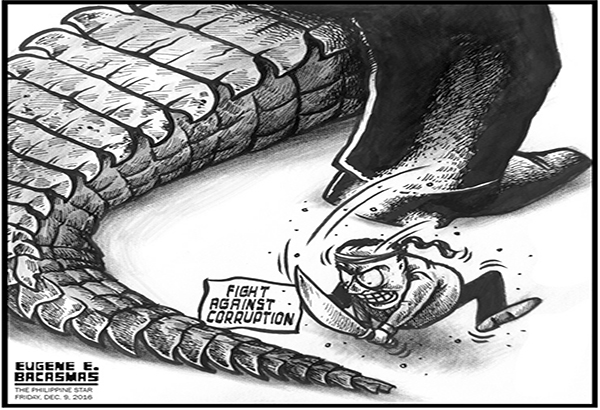EDITORIAL - A commitment vs corruption

In 2003, the United Nations recognized the adverse effects of corruption on sustainable development, the rule of law and democracy. The recognition of the problem led to the approval by the UN on Dec. 9, 2003 of the Convention Against Corruption, the first such instrument that is legally binding around the world.
Since the convention went into force on Dec. 14, 2005, 140 of the 180 parties have become signatories. These include the Philippines, which ratified the pact on Nov. 8, 2006, becoming the second country in Southeast Asia and the fifth in Asia to do so.
The convention commits signatories to undertake preventive measures against graft, criminalize a broad range of acts of corruption as well as cooperate with the international community in fighting the problem and in recovering ill-gotten assets of crooked individuals.
Public officials must be reminded of these commitments as the nation joins the world in marking the anniversary of the signing of the convention today. Since the Philippines ratified the convention, corruption scandals continued to rock the country. The pork barrel scandal and the anomalous deals involving the Metro Rail Transit are just some of the examples of the adverse impact of corruption on the delivery of basic services and development efforts.
Apart from large-scale corruption, Filipinos are also plagued by petty graft at all levels of the bureaucracy. The need to oil the wheels of government with grease money has turned off investors, dampened entrepreneurship and made life difficult for millions of Filipinos.
President Duterte has promised a clean government and is reportedly preparing to go after corrupt public servants. For this campaign to succeed, it must include not only ferreting out and punishing crooked government workers but also structural reforms that will plug opportunities for graft. It must also include a serious effort to identify and recover the fruits of corruption.
Along this line, the government must revitalize the effort to hold someone accountable for the enormous wealth illegally accumulated during the Marcos dictatorship. Billions in assets have been recovered and traced to the Marcos regime, but so far no one has gone to prison for illegally amassing the wealth. The failure to punish corruption of such magnitude is one of the reasons why the problem persists.
- Latest
- Trending
























